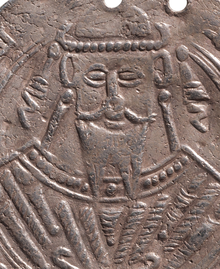This article needs additional citations for verification. (December 2019) |
| al-Mutawakkil المتوكل | |||||
|---|---|---|---|---|---|
 Bust of al-Mutawakkil on a silver dirham | |||||
| 10th Caliph of the Abbasid Caliphate | |||||
| Reign | 10 August 847 – 10 December 861 | ||||
| Predecessor | al-Wathiq | ||||
| Successor | al-Muntasir | ||||
| Born | 31 March 822 Baghdad, Abbasid Empire | ||||
| Died | 11 December 861 (aged 39) Samarra, Abbasid Empire | ||||
| Burial | |||||
| Consort | List
| ||||
| Issue |
| ||||
| |||||
| Dynasty | Abbasid | ||||
| Father | al-Mu'tasim | ||||
| Mother | Shuja | ||||
| Religion | Sunni Islam | ||||
Ja'far ibn Muḥammad ibn Hārūn al-Mutawakkil ʿalā Allāh (Arabic: جعفر بن محمد بن هارون, romanized: Jaʿfar ibn Muḥammad ibn Hārūn); March 822 – 11 December 861, commonly known by his regnal name al-Mutawwakil ala Allah (Arabic: المتوكل على الله, romanized: al-Mutawakkil ʿalā Allāh, lit. 'He who relies on God'), was the tenth Abbasid caliph, ruling from 847 until his assassination in 861. He succeeded his brother, al-Wathiq (r. 842–847), and is known for expanding the empire to its maximum extent.[1] He was deeply religious, and is remembered for discarding the Muʿtazila, ending the Mihna (a period of persecution of Islamic scholars), and releasing Ahmad ibn Hanbal. He is also known for his tough rule, especially with respect to non-Muslim subjects.
He was assassinated on 11 December 861 by the Turkic guard with the support of his son, al-Muntasir, marking the beginning of the period of civil strife known as the "Anarchy at Samarra".
- ^ Rein Taagepera (September 1997). "Expansion and Contraction Patterns of Large Polities: Context for Russia". International Studies Quarterly. 41 (3): 475–504. doi:10.1111/0020-8833.00053. JSTOR 2600793. Archived from the original on 19 November 2018. Retrieved 28 December 2018.